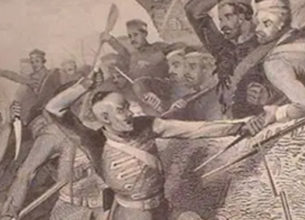DADABHAI NAOROJI’S BIRTH ANNIVERSARY
05, Sep 2019

Prelims level : History of Modern India, Indian National Movement
Mains level : GS-I- Modern Indian History from about the middle of the Eighteenth Century until the present - significant Events, Personalities, Issues
Context:
- September 4, 2019 was the 194th birth anniversary of Dadabhai Naoroji, the “Grand Old Man of India”, who was among the first leaders who stirred national consciousness in the country.
About Dadabhai Naoroji:
- Born in 1825 at Navsari, in present-day Gujarat
- Apart from having a distinguished political career, Naoroji was also a professor of Gujarati, mathematics, and natural philosophy, and also worked as a businessman.
- Naoroji’s lasting intellectual contribution was to expound the ‘Drain Theory’.
- He was closely involved with the Indian National Congress in its early phase, and served as the first Indian member of the British parliament.
Early work in England:
- Naoroji began rousing public opinion in England on Indian issues in 1855, after he moved from India to Liverpool for business.
- His first agitation, in 1859, concerned recruitment to the Indian Civil Service (today’s IAS).
- In 1865 and 1866, Naoroji helped found the London Indian Society and the East India Association
- The two organisations sought to bring nationalist Indians and sympathetic Britons on one platform.
- As the secretary of the East India Association, Naoroji travelled in India to gather funds and raise national awareness.
Leader of The Indian National Congress:
- In 1885, Naoroji became a vice-president of the Bombay Presidency Association, was nominated to the Bombay legislative council by Governor Lord Reay, and helped form the Indian National Congress.
- He was Congress president thrice, in 1886, 1893, and 1906.
- At the 1906 Congress session in Calcutta Dadabhai Naoroji declared that the goal of the Congress was to attain Swaraj.
- The first session of the Congress in 1885 passed a resolution calling for the formation of a standing committee in the British House of Commons for considering protests from legislative bodies in India.
- Naoroji dedicated his efforts towards this objective when he returned to England in 1886.
Election to The British Parliament:
- Naoroji first ran for the British Parliament in 1886, but did not get elected.
- His second bid in 1892 was successful, when he won the Central Finsbury seat on a Liberal Party ticket.
- In the British Parliament, Naoroji worked to bring Indian issues to the fore. In 1893, he helped form an Indian parliamentary committee to attend to Indian interests. The membership of the committee significantly grew in numbers in the coming years, becoming an important lobbying force.
- Naoroji was a vocal critic of the colonial economic policy in India. In 1895, he became a member of the royal commission on Indian expenditure.
- A moderate himself, Naoroji acted as a liaison between nationalist Indians and British parliamentarians.
Drain Theory:
- Dadabhai Naoroji was among the key proponents of the ‘Drain Theory’, disseminating it in his 1901 book ‘Poverty and Un-British Rule in India’.
- Naoroji argued that imperial Britain was draining away India’s wealth to itself through exploitative economic policies, including India’s rule by foreigners; the heavy financial burden of the British civil and military apparatus in India; the exploitation of the country due to free trade; non-Indians taking away the money that they earned in India; and the interest that India paid on its public debt held in Britain.








